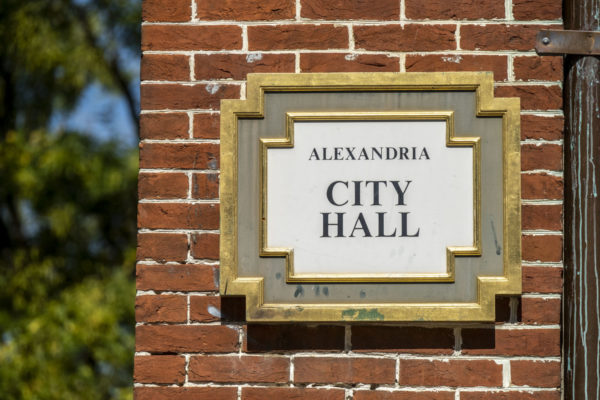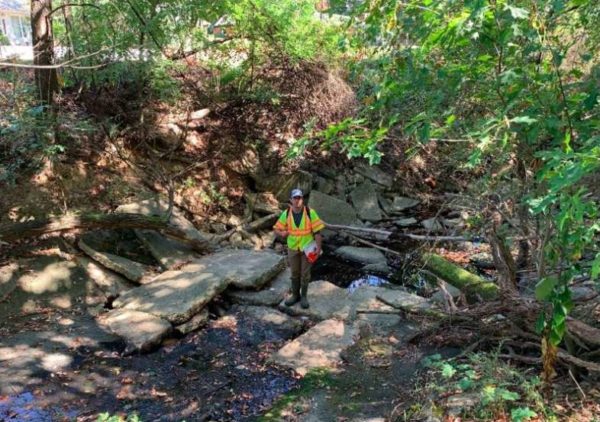
Alexandria is sending $3 million in grant funding back to the state after controversial stream restoration projects fell through.
When the stream restoration projects return later this year, city leadership made it candidly clear that Alexandria taxpayers will likely shoulder more of the cost thanks to the lost grant funding.
Mayor Justin Wilson noted that an ordinance approved in the City Council meeting last night (Tuesday) starts the process of rescinding two grants received for the Taylor Run and Strawberry Run stream restoration projects, totaling $2.2 million and $800,000 respectively.
Back in 2021, the City of Alexandria was in the final stages of a plan to replace the existing Taylor Run stream with a “natural channel design” that would make the creek more shallow and cut back on erosion.
But the project faced opposition from a wide array of sources across the local political spectrum, from groups like Bring Integrity Back to Alexandria to the Audubon Society of Northern Virginia.
Some local activists criticized the plan for clearing out existing foliage and noted that the city relied on pollution estimates rather than taking measurements, but city staff likewise said activists were using inaccurate data and, in trying to preserve some foliage rather than improving the local environment, were missing the forest for the trees.
The City Council ultimately voted to send the projects back for more study, but Wilson said the decision to return the funding to the state caught him off guard.
“I will say: when we had that discussion last time, I will be honest, I did not expect this to take as long as it did and I did not expect that was a final decision to forego the grants and I did not see it as that at the time,” Wilson said. “I’m a little concerned from a process perspective that we essentially made a decision to return the grants without making a decision to return the grants.”
Wilson said one source of frustration is that the city deferring the project to build consensus resulted in the project — as it had been developed up to that point — being quietly killed off.
“From the overall process perspective here… the concern I have is one that this is ultimately not just a $3 million decision, it’s potentially [much] more,” Wilson said. “This is a significant decision that we kind of made by happenstance, if you will.”
Beyond just being improvements to Taylor Run and Strawberry Run, the stream restoration projects were designed to help fulfill the Chesapeake Bay Total Maximum Daily Load (TMDL) cleanup mandates — a requirement to decrease the amount of nitrogen and phosphorous Alexandria is putting into the Chesapeake Bay.
Per the City’s Municipal Separate Storm Sewer System (MS4) Permit, the city is still on the hook for decreasing those pollutants somehow. City staff earlier warned various alternatives to stream restoration could be more expensive, and now the city could have to handle that without state support.
“Nevertheless, we’ve made that decision and we’re returning $3 million worth of grants and that whatever ends up coming out of the process that we’ve had underway now, as it relates to these two sites, is probably going to entirely fall on the taxpayers of the City of Alexandria,” Wilson said. “I think that’s an important point and one that should be abundantly transparent to the residents.”
Jesse Mains, stormwater division chief, said city staff will head back to the City Council in June with more plans about what’s next for Taylor Run and Strawberry Run.
“We would need to go get a designer,” Mains said. “We need to go through the procurement process, which will take six to nine months. [Add] another seven to nine months to procure construction services, and about seven months to build it, roughly.”
Mains said the city is looking at Fall/Winter 2026 for a new stream restoration project to be finalized. Mains said that project would likely be in next year’s Capital Improvement Program.
“We’re pretty positive it would not be eligible for any kind of further grants,” Mains said.
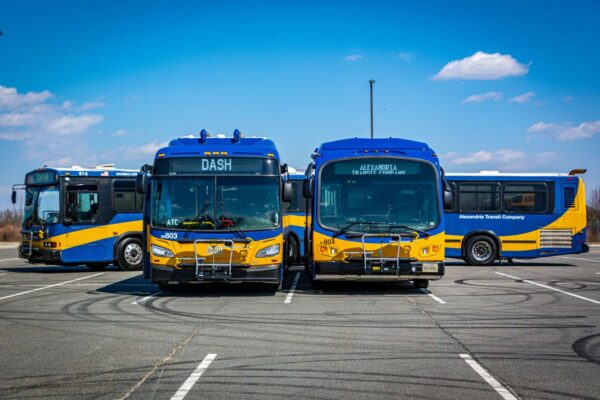
Alexandria is hoping a federal grant could help push Alexandria’s DASH bus network a little closer to full electrification.
A memo from Deputy Director of Transportation Hillary Orr to the Transportation Commission said the city is hoping federal funding can help cover a sizable budget gap looming for electric bus replacement plans.
The DASH bus network has been crawling toward electrification for years despite challenges, from difficulties with hilly terrain to a lack of charging stations. The city’s goal is a fully electric fleet by 2037.
Currently, DASH has 14 electric buses in circulation and 87 “clean diesel” and hybrid buses. The bus network’s plans include replacing ten additional buses and five trolleys that have reached the end of their useful life — but replacing these buses and trolleys with electric alternatives is costly.
“To replace these assets with battery electric buses and trolleys will cost an estimated $19.3 million,” Orr wrote in the memo. “The City currently has budgeted $4,798,900 for the replacement of these buses, leaving a gap of $14.5 million.”
Beyond just the electric bus costs, Orr wrote there is an additional smaller budget gap for new clean diesel buses.
“Additionally, the City was previously awarded $4.4 million in Smart Scale funds for six clean diesel buses,” Orr wrote. “To upgrade these buses to battery electric would cost an additional $3.1 million.”
Orr wrote that DASH and City staff are submitting multiple applications to the Federal Transit Administration’s (FTA) Low or No Emission Grant Program:
The following projects could be submitted within these applications.
- Trolley Replacement (up to $6.8 million): Retire and replace five (5) trolleys with electric trolleys.
- Bus Replacement (up to $12.5 million): Retire and replace ten (10) buses with electric buses.
- Smart Scale Expansion Buses (up to $7.5 million): Upgrade six (6) Smart Scale clean diesel buses to electric buses.
- Electric upgrades at DASH Facility (up to $9 million): Build new electrical service, including on-site equipment and infrastructure to support charging need of fleet wide conversion to battery electric buses.
- Workforce Development (up to $1.6 million): Required 5% of federal request.
In total, Orr wrote that the city is seeking $38 million in grant funding.
“While it is unlikely the full grant request will be awarded, staff determined the best path forward is to propose all needs in a scalable manner by which the FTA can assess and award funds as available,” Orr wrote.
The grants are headed to the Transportation Commission for review at a meeting on Wednesday, March 15.
Photo via DASHbus/Facebook

Alexandria’s City Council is looking to a federal grant to help relieve some of Alexandria Fire Department’s (AFD) chronic understaffing.
The city is applying for a grant for $6.8 million from the Federal Emergency Management Agency (FEMA) to fund 25 additional firefighter positions for AFD.
The money would come from the Staffing for Fire and Emergency Response (SAFER) grant program, which provides funding to fire departments and volunteer firefighter organizations struggling to meet industry minimum standards and to maintain 24-hour staffing.
“The goal of this grant application is to fund 25 new firefighter positions in the AFD,” a memo from Fire Chief Corey Smedley said. “As part of the City’s collective bargaining agreement, the department is transitioning from a 56 to 50-hour work week. Hiring up to 25 new firefighters will provide staffing relief and reduce the need for overtime with the goal of safer working conditions.”
Smedley said AFD previously used SAFER grant funding to reach four-person staffing on fire engines and ladder trucks.
“A SAFER grant will pay for the salary and benefits of the positions for the first three years, then requires the locality to fully fund the positions in the fourth year,” Smedley wrote.
Alexandria has shelved a grant program aimed at helping minority business owners after a lawsuit claiming the program discriminated against white people.
The program’s cancelation was first reported by the Washington Post.
The program was designed to help Black, Indigenous and people of color (BIPOC) who owned businesses in Alexandria. Engineering firm Tridentis, LLC filed a lawsuit in the U.S. District Court for the Eastern District of Virginia in January claiming the program was “blatantly illegal” and violated the Equal Protection Clause.
A statement on the program’s website said the program, as currently proposed, would not be launched:
Over the past several months, the City has worked to develop a grant program to meet the needs of our diverse small business community – an important foundation of Alexandria’s continued economic development. A lawsuit challenging the BIPOC small business grant program was filed in federal court in January. Upon review of the lawsuit and the program, we have decided we will not launch the program as currently proposed. Instead, we will review options to use this funding to meet the needs of our diverse small business community in a more comprehensive and sustainable way, and look forward to launching a program that achieves that goal. Our City remains committed to serving all Alexandrians and focused on our responsibility to find equitable solutions to address the challenges they face. More details will become available on the new program over the coming months.
The Washington Post reported that Alexandria officials admitted that the grant criteria as written was a violation of the 14th Amendment, but that the city would work to find other ways to help minority business owners disproportionately impacted by the pandemic.
(Updated 2:30 p.m.) The recently formed Alexandria Minority Business Association (AMBA) shared frustrations about a lawsuit putting a planned grant program on hold.
The City of Alexandria approved a grant program aimed at benefiting Black, Indigenous and people of color (BIPOC) business owners. Applications were set to be released in the coming weeks, but a lawsuit has put those plans on hold.
The grant would have allocated $500,000 worth of funds ot businesses with at least 51% BIPOC ownership, with a maximum amount of $7,000 per recipient.
Earlier this week, engineering firm Tridentis, LLC filed a lawsuit against the City of Alexandria claiming the city is discriminating based on race. Tridentis is a military contractor based in Alexandria.
“This program is blatantly illegal,” the lawsuit claimed. “The Equal Protection Clause prohibits Alexandria from discriminating based on race, and this express racial exclusion cannot possibly satisfy strict scrutiny. Plaintiff, a business in Alexandria who wants to apply for the program but is excluded because its owner is the wrong race, is entitled to relief.”
Tridentis has received over $1 million in forgiven loans since early 2020.
Kevin Harris, founder of AMBA, called the lawsuit political theater, noting that the contractor donates thousands of dollars to right-wing politicians or groups every year.
“Tellingly, Tridentis has hired Consovoy McCarthy PLLC as their legal counsel for this suit.” said Harris. “I think that shows pretty clearly what their end-goal is.”
Pastor Lou Whiting, leader of the Social Responsibility Group (SRG), called the pause in the grant program disappointing.
“SRG is deeply disappointed that our City now faces this legal challenge in its efforts to address the compelling governmental interests of diversity, equity, and inclusion for members of their constituency that have been systematically denied a full opportunity to participate in aspects of economic, social, and civic life.” said Pastor Whiting. “Diversity, equity, and inclusion are essential priorities for Alexandria and our entire nation. This lawsuit demonstrates our need for sustained action.”
https://twitter.com/AKSSInAlex/status/1618298038216445952
ALXnow reached out to a Tridentis phone number but recieved no response.

Updated at 2 p.m. — A lawsuit challenging a city-run grant program benefiting entrepreneurs of color is delaying its launch.
The City of Alexandria announced the delay of the grant program benefiting Black, Indigenous and people of color (BIPOC) on social media, saying the launch has been postponed while the city reviews the lawsuit.
Engineering firm Tridentis, LLC filed the suit (PDF file) in the U.S. District Court for the Eastern District of Virginia on Jan. 22. The Alexandria-based firm says that the program is “blatantly illegal” and is seeking a temporary restraining order and preliminary injunction to bar the city from opening the program’s application period on Jan. 26.
“To be eligible for the program, a business must demonstrate that its owners are at least 51% black, indigenous, or people of color,” Tridentis said in its court filing. “These BIPOC owners must come from one of four groups–Black or African American, Asian American, Hispanic American, or Indigenous or Native American. In other words, no whites allowed.”
Tridentis continued, “This program is blatantly illegal. The Equal Protection Clause prohibits Alexandria from discriminating based on race, and this express racial exclusion cannot possibly satisfy strict scrutiny. Plaintiff, a business in Alexandria who wants to apply for the program but is excluded because its owner is the wrong race, is entitled to relief.”
Tridentis, which is being represented by Bryan Kipp Weir, is alleging that the city is violating due process and equal protection. The company is asking for the following:
- A declaratory judgment that (the city’s) Defendant’s BIPOC Small Business Grant Program violates the Fourteenth Amendment of the United States Constitution.
- A temporary restraining order and preliminary injunction barring Defendant from opening the application period, closing the application period, selecting grant recipients, or enforcing its racially discriminatory eligibility criteria for the BIPOC Small Business Grant Program.
- A permanent injunction barring Defendant from enforcing its racially discriminatory eligibility criteria for the program.
- Nominal damages.
- Reasonable costs and expenses of this action, including attorneys’ fees, under 42 U.S.C. §1988 and any other applicable laws.
- And all other relief that Tridentis is entitled to.
Today, the City was served with a lawsuit challenging the BIPOC Small Business Grant Program. We are postponing the launch while we review the lawsuit. Despite this delay, the City remains committed to supporting our minority small business community and promoting equity for all.
— AlexandriaVAGov (@AlexandriaVAGov) January 24, 2023
The grant website said the city was served with a lawsuit yesterday:
NOTICE: On January 23, 2023, the City was served with a lawsuit challenging the BIPOC Small Business Grant Program. Applications were set to open on January 26; however, we are postponing the application process while we review the lawsuit. Despite this delay, the City remains committed to supporting our minority small business community and promoting equity for all. Please send all inquiries to [email protected].
The city has been set to release applications on Thursday, Jan. 26. The grant was approved by the City Council in October, along with funding meant to boost the voices of minority business owners in discussions of city policy.
The purpose of the grant was to support Black-owned businesses disproportionately impacted by the pandemic. Nationwide, Black-owned businesses saw a 28% earnings decrease in 2020 compared to a 15% drop for White-owned businesses and a 17% overall decline, Bloomberg reported.
“While many businesses have struggled and are still recovering in the wake of the COVID-19 pandemic, these hardships are particularly felt by Black, Indigenous and people of color (“BIPOC”) owned businesses due to structural barriers and discriminatory financial lending practices,” the city said in a release.
My commitment to supporting our diverse businesses is unwavering. Very disappointed to share this news.
Please send all inquiries to [email protected]. pic.twitter.com/L461ywcxaY
— Alyia Gaskins (@Alyia4ALX) January 24, 2023
James Cullum and Vernon Miles contributed to this story

Alexandria business owners that identify as Black, indigenous or a person of color could get $1,000-$7,000 in grant funding from the city.
The city announced in a release that applications are set to launch on Thursday, Jan. 26, and will be offered on a first-come, first-served basis.
The grant funding was approved by the City Council back in October, along with funding aimed at boosting the voices of minority business owners in discussions of city policy.
Black-owned businesses were disproportionately hit by the pandemic, showing a 28% earnings decrease in 2020 compared to a 15% drop for White-owned businesses and a 17% overall decline, Bloomberg reported.
“While many businesses have struggled and are still recovering in the wake of the COVID-19 pandemic, these hardships are particularly felt by Black, Indigenous and people of color (“BIPOC”) owned businesses due to structural barriers and discriminatory financial lending practices,” the city said in a release.
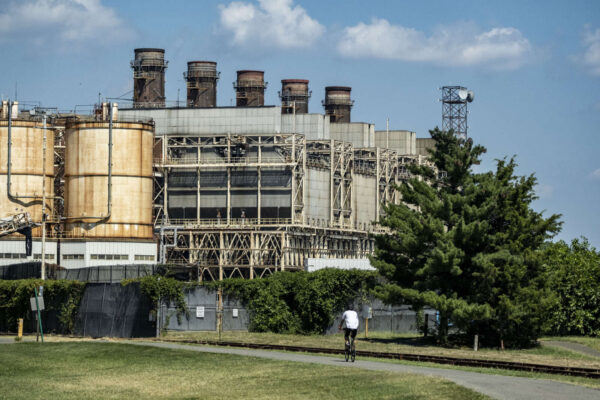
A volunteer-led group representing the rapidly-developing Old Town North will now have paid leadership, with funding from the City of Alexandria.
The group will be focused on assisting the city’s goals of turning Old Town North into an arts hub, amid several sweeping developments in the works there, including the eventual demolition and redevelopment of the GenOn Power Plant.
The city is giving the group $83,000 in American Rescue Plan Act funding, which it will spend on staffing.
“This grant will enable OTNA to move beyond the all-volunteer stage with new professional staff, and to intensify its work toward its goals of implementing the Old Town North Small Area Plan and the Old Town North Arts and Cultural District,” per a release.
The grant comes as big changes are in the works to the area, facilitated by the same density trade that creates affordable housing to create arts spaces. The move has created some concern that it sets arts and affordable housing up as competing interests.
Last October, the Alexandria Economic Development Partnership announced it would be allocating $535,000 in total to several community organizations around Alexandria, including the Old Town North Alliance.
Former Vienna Town Council member Edythe Kelleher was hired as the first executive director.
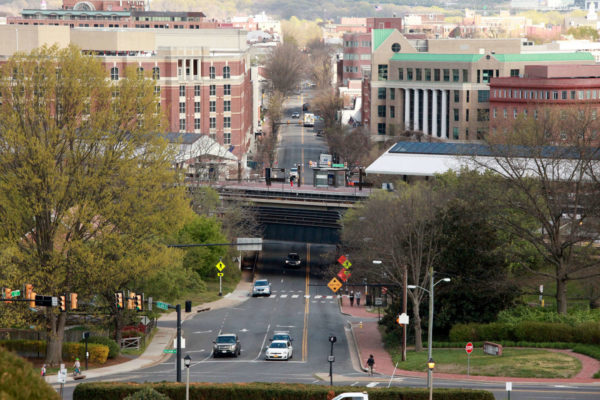
Alexandria is hoping to get $400,000 from the state to help with resurfacing — particularly for the city’s iconic King Street.
The City Council is set to review a grant application to the Virginia Department of Transportation’s State of Good Repair program.
Alexandria is applying for up to $400,000, with $50,000 to be set aside specifically for King Street. The grant would pay for resurfacing of the street between South Peyton Street — a few blocks from the King Street Metro station — down to Washington Street.
A map showing the results of a 2019 Pavement Condition Inventory (CRI) showed “very poor” and “serious” road conditions on King Street for nearly every block from the Metro station to waterfront.
Very poor and serious road conditions are defined by the city as:
Pavement in extremely deteriorated condition. Numerous areas of instability. Majority of section showing structural deficiency. Ride quality is poor.
Parallel — and, granted, less heavily used — Cameron and Prince Streets scored highly for nearly the full length of the road.
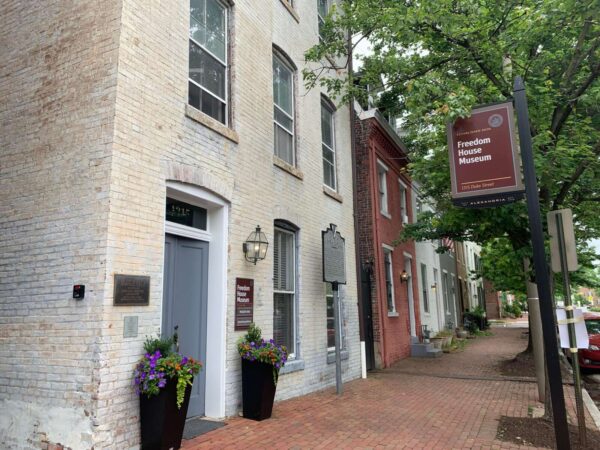
A grant from the National Park Service (NPS) will help close the funding gap needed to restore Alexandria’s new Freedom House Museum.
Once a major hub for the slave trade, 1315 Duke Street reopened in May as a museum dedicated to telling the stories of those trafficked through the building. While the exhibits are open to the public, there is still significant work needed to be done to preserve the building.
The Save America’s Treasures grant from the NPS, awarded back in September, will help cover those costs.
“The $500,000 grant will be used to support the exterior restoration of the museum building, which was once the Alexandria Slave Pen, and the offices of several slave traders, including the notorious slave-trading firm, Franklin and Armfield,” the Office of Historic Alexandria said in a newsletter. “The overall preservation plan for the building includes re-pointing; repairing or replacing windows, doors, woodwork, and wood siding; improving the gutter and downspout system, and waterproofing the foundation.”
Exhibits in the museum include personal narratives, like a man freed from slavery in Texas who walked back to Alexandria, and archeological evidence such as items recovered from the yard behind the building.
The Office of Historic Alexandria said the grant will help preserve the building against weathering.
“These steps will seal the building envelope, correcting and preventing further degradation,” the newsletter said. “This work is prioritized based on a Historical Structure Report (HSR) conducted by SmithGroup in 2021 for Historic Alexandria.”


